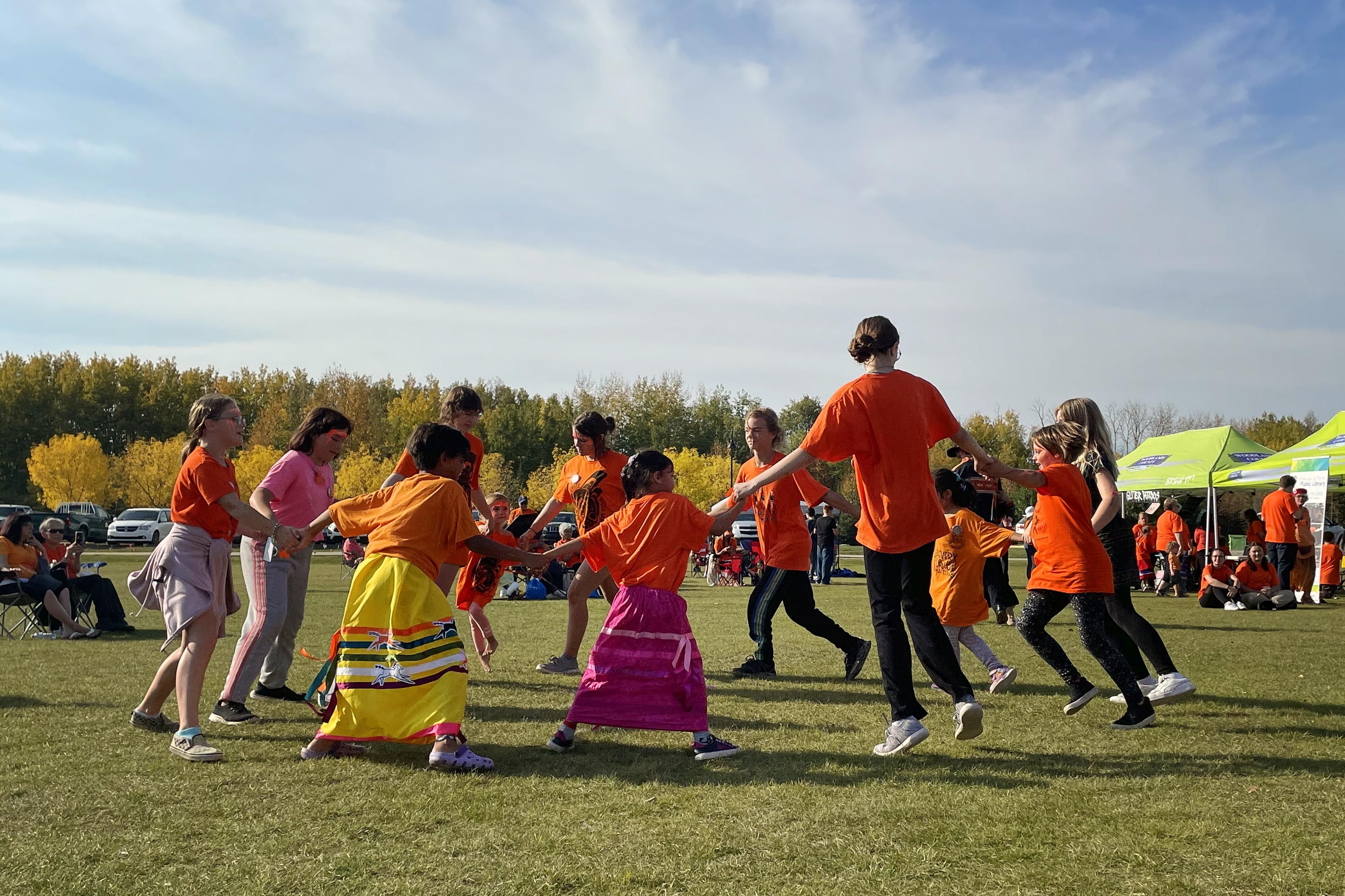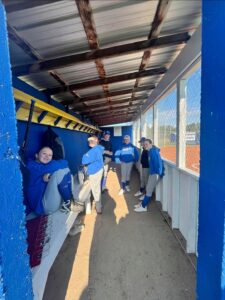
On Friday last week, the local celebration for Orange Shirt Day/National Day for Truth and Reconciliation brought hundreds of people to Rotary Park. The day kicked off with a walk downtown along the parade route. Those who had attended last year’s event said the crowd was much bigger this year; some saying attendance was at least triple.
Once back from the walk, guests participated in a feast with traditional foods like Bannock, soups, stews, and desserts. Then, MC Don Burnstick took over the mic. A Cree comedian and motivational speaker from Alexander First Nation, Burnstick is known internationally for his edgy jokes, often poking fun at himself.
Speaking of the damage caused by residential schools, Burnstick described it as a tsunami. “The most powerful force we have on Mother Earth is water. We saw the power of it in Nova Scotia and Florida. If water wants something, it just takes it. When the government came here, they didn’t understand our people and how we were connected to the land. They couldn’t change the elders. They couldn’t change the adults. So, the children were introduced to the system. I call that a tsunami.”
Burnstick explained that the first “wave” happened over a hundred years ago. “We had a tsunami called Residential School, which went back into the ocean in the 60s when they started closing the schools. The tsunami went back in, but what we have seen over the decades, and I grew up in it, is the destruction from it. The alcoholism, the poverty, the child welfare, the abuse, the missing and murdered women, and all our kids being taken away. All our boys in prison. All those things directly result from the tsunami and the damage.”
As a truth teller, Burnstick recounted the trauma he suffered as a child, growing up with violence, alcoholism, and sadness. “It’s hard to say your truth. But understand that’s key to healing. I’m an entertainer, but sometimes I have to be honest about my life, my pain, and my past. That’s where my strength and power come from. Surviving is one thing, but now we have to thrive.”
One by one, different people shared their stories and their families’ stories. One man spoke of making friends in residential school only to see them leave and never return. Another spoke of being scared as he was taken away from his family and everything he knew. As stories were shared, emotions were felt through the audience and performers.
“We are all going to be feeling stuff, and that’s called residual trauma. That’s from my parents, your grandparents. All of us are affected by this. And now, we realize through truth-telling that all Canadians are affected by this. We all have to heal. It’s times like this and days like this that are really important. We want to remember. We feast to honour those that went before us. We remember those babies they are still looking for. There is still lots of work to do. We are here to honour this day,” said Burnstick.
Performances by the Alexis Nakota Sioux Nation Drummers brought people to their feet. Powerful voices singing could be felt reverberating throughout the park. Dancers in exquisite traditional regalia were a delight to watch as they stepped to the beat, making their way around the drum circle. Attendees were invited to join, filling the space as children and adults jumped at the chance to join.
Burnstick said standing together, dancing together and supporting each other was what reconciliation is all about. “Reconciliation is about understanding our way as Indigenous people. No more divide, like, this is your family, and this is my family. No more colour. No more of that. These days are important because it lifts everyone together.”
Lonnie Letendre, Councillor with Alexis Nakota Sioux Nation, helped MC for some of the afternoon, sharing stories and introducing dancers. “God has given us eyes to see things before us and ears to listen to what’s right, to do what’s best,” he told the crowd.
Both Letendre and Burnstick spoke of the importance of hearing from elders and survivors about their experiences in residential schools. “Understand something, especially for the young people, you’re going to go to these gatherings in twenty or thirty years, and there won’t be any more survivors. They will all be gone. When you see a survivor, don’t just nod, they are here and are ready to talk and tell their truth. I strongly recommend to the young people to find a survivor and hear their truth. It’s really important. Not just for you, but it’s important for the survivor. Thank them for sharing their truth with you. This is our valuable resource. We can’t forget our past. Sometimes the past isn’t good, but we need to remember them to move forward,” explained Burnstick.
Many speakers spoke of overcoming alcoholism, brought on by their deep trauma. Those who talked about it were brutally honest. They spoke of broken families, being at the edge, facing suicidal thoughts, and finding their way back. One of the performers, Fiddler Alex Kusturok, recently performed for Pope Francis in Rome as part of a Metis Delegation. He showed that the music survived residential schools and was not taken away.
“I got sober three years ago. Alcoholism is so common with our people. I used to blame everybody. I blamed the way that I was raised and the ex-relationships that I had. On June 23, 2019, something happened to me. I woke up in an apartment by myself. Everybody I had blamed was gone,” recalled Kusturok. The man who had sexually abused him was dead, and his stepdad, who beat him, was gone. “I asked myself, why am I still doing this? It was the one moment in my life when I realized that I was the problem. As soon as I admitted that, life started to get good. Life started to present opportunities to me.”
With his wife and young son by his side, Kusturok is racking up his career highlights, including his trip to Rome, eight-time Manitoba Metis Champion, and participating in the five-day Indigenous Day Live Winter Solstice, which aired on APTN. His talents on the fiddle were a great addition to the Whitecourt celebration. “All the old timers, that’s how they used to play, just the fiddle and feet. That kind of got lost. I’m not doing anything new here. I’m just trying to preserve and pass down what was so freely passed onto me.”
The event, put on by the Whitecourt Indigenous Friends Society, was very well attended from start to finish. “Thank you for turning Canada orange. That’s what it is all about,” said Burnstick as he closed the festivities.







More Stories
Community spirit shines at large-scale youth baseball event
Birthday party chaos sung beautifully by Pumpjack Players’ youth in spring musical
Gearing up for another season of cars, cruising and camaraderie